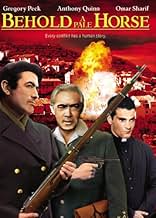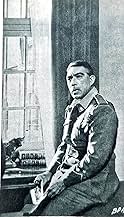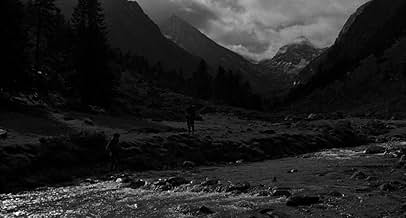IMDb RATING
6.7/10
2.4K
YOUR RATING
Famous Spanish bandit Artiguez returns to his native Spanish village after 20 years in French exile, but Spanish cop Vinolas sets a trap for him.Famous Spanish bandit Artiguez returns to his native Spanish village after 20 years in French exile, but Spanish cop Vinolas sets a trap for him.Famous Spanish bandit Artiguez returns to his native Spanish village after 20 years in French exile, but Spanish cop Vinolas sets a trap for him.
Marietto
- Paco Dages
- (as Marietto Angeletti)
Perrette Pradier
- Maria, Hussy
- (as Perette Pradier)
- Director
- Writers
- All cast & crew
- Production, box office & more at IMDbPro
Featured reviews
In 1939 like John Wayne's Ethan Edwards in The Searchers, Gregory Peck does not believe in surrenders. When all the others give up their weapons and go home, Peck conspicuously keeps his and keeps up the good fight. Of course twenty years later, Peck's become nothing more than a common bandit with the barest trappings of the revolutionary ardor he once had for the Republican cause in the Spanish Civil War.
His rival, his Pat Garrett to Peck being Billy the Kid, is the local captain of the Guardia Civil in Anthony Quinn. Peck's constant raids into his border area from France are a source of embarrassment to him and block his chances for advancement. At one time Quinn was a hardened Falangist, but now he's just a policeman.
Twenty years as made a lot of changes in both men. Quinn a devote Catholic who probably joined the fascist forces because of the anti-clerical attitudes of the Republican government now observes the form of religion, but he's got a mistress on the side. When he goes to pray it's not for anything profound, just please let him get Peck so he can advance.
Peck is as anti-clerical as he was during the Spanish Civil War in the late Thirties, but now is really into it a lot for violence's sake. He also knows his cause is long lost, but needs the excuse for what he's now doing. He also gets quite a surprise in finding a priest like Omar Sharif going to warn him about an informer in his crew. Catholics do come in all shapes and sizes.
Although Peck is somewhat miscast as a Spaniard, still he does a good job as does Quinn and Sharif. The strength of Behold a Pale Horse is that it presents both Peck and Quinn as flesh and blood people, neither of them all good or all evil from your point of view.
Behold a Pale Horse was made in 1964 and eleven years later Francisco Franco in whose service Quinn was in died after being dictator of Spain for 36 years. When I visited Spain in 2001 the thing that struck me was how there was very little evidence of Franco's reign. Spain has now settled quite nicely into a constitutional monarchy with a functioning parliament. And the Catholic church which rode as high in Spain as it did during Philip II is rapidly losing influence.
Kind of makes you wonder just what Peck and Quinn were fighting about.
His rival, his Pat Garrett to Peck being Billy the Kid, is the local captain of the Guardia Civil in Anthony Quinn. Peck's constant raids into his border area from France are a source of embarrassment to him and block his chances for advancement. At one time Quinn was a hardened Falangist, but now he's just a policeman.
Twenty years as made a lot of changes in both men. Quinn a devote Catholic who probably joined the fascist forces because of the anti-clerical attitudes of the Republican government now observes the form of religion, but he's got a mistress on the side. When he goes to pray it's not for anything profound, just please let him get Peck so he can advance.
Peck is as anti-clerical as he was during the Spanish Civil War in the late Thirties, but now is really into it a lot for violence's sake. He also knows his cause is long lost, but needs the excuse for what he's now doing. He also gets quite a surprise in finding a priest like Omar Sharif going to warn him about an informer in his crew. Catholics do come in all shapes and sizes.
Although Peck is somewhat miscast as a Spaniard, still he does a good job as does Quinn and Sharif. The strength of Behold a Pale Horse is that it presents both Peck and Quinn as flesh and blood people, neither of them all good or all evil from your point of view.
Behold a Pale Horse was made in 1964 and eleven years later Francisco Franco in whose service Quinn was in died after being dictator of Spain for 36 years. When I visited Spain in 2001 the thing that struck me was how there was very little evidence of Franco's reign. Spain has now settled quite nicely into a constitutional monarchy with a functioning parliament. And the Catholic church which rode as high in Spain as it did during Philip II is rapidly losing influence.
Kind of makes you wonder just what Peck and Quinn were fighting about.
I watched this movie, and like most of the people have already expressed it, must say that this is truly a classic. The acting crew is excellent with Peck, Shariff and Quinn giving some very intense performances. But the surprise package is the boy who crosses over to the French part where he goes in search of Manueal to ask him to avenge his father's death at the hands of Vinollas. I often read comments that Peck is stuff or wooden on occasions, but I find him one of the most intense actors because of his ability to convey through his eyes. Like most actors, he is gifted of conveying a lot more through his eyes than his body might suggest. He conveys the frailing Manuel artigez here very well. We know that Manuel is tired and wary of the struggle he has pursued so passionately. Full credit to Peck for portraying that very effectively. Omar Shariff is also brilliant as the confused priest. Quinn is natural and we feel a certain angst against him, I do not know why. The end is excellent which again, conveys the human side of Manuel very well. All in all, an excellent movie worth watching on a calm Sunday afternoon.
When the Spanish War was finished, winners devoted to go after anybody who reflected the red light of the communism or any other color they dislike. On the other hand, few guerilla fighter continued his actions against the winners. But their strength was lower every time. One of this guerrilla was Valentin González "el campesino", which figure is portrayed in this film in a free form (not in an historical form).
Twenty years after the Civil war conclusion, the Spanish police has a good option to capture one of these ex-combatants, who was in exile in France. The description of the methods and day-to-day life of the Spanish police could be the reason which explains that the Spanish Government forbade any more Columbia's film in Spain.
You need no knowledge about the twenty Century Spain's history to understand the film, although you can enjoy more it if you know something. In fact, the film put in a specific political situation the psychological confrontation between two men. It could be a good exercise to understand the motives which impulse his actions.
Twenty years after the Civil war conclusion, the Spanish police has a good option to capture one of these ex-combatants, who was in exile in France. The description of the methods and day-to-day life of the Spanish police could be the reason which explains that the Spanish Government forbade any more Columbia's film in Spain.
You need no knowledge about the twenty Century Spain's history to understand the film, although you can enjoy more it if you know something. In fact, the film put in a specific political situation the psychological confrontation between two men. It could be a good exercise to understand the motives which impulse his actions.
This is a film which has almost faded into total obscurity, and that's tragic, because it's well worth seeing. It's sort of a thinking person's suspense movie, better appreciated if you know some details about the intricate historical background in which it is set. Even so, it can be appreciated for its dramatic settings and characterizations. It has a complicated plot, to be sure, but the story rolls right along...not a lot of action until the end, but the tension builds steadily. I'm no fan of Peck, but his role here really drew me in. He looks beaten down by a hard life and way too much unhealthy passion. Quinn doesn't have much screen time, but I liked some of the minor characters best...their faces were great. The credit sequence, meshed together perfectly with newsreels, shows a long line of defeated soldiers, their faces reflecting defeat and confusion... a great tracking scene.
Here are some reasons I think the film is unknown: 1. The main character is an atheist communist anti-catholic guerilla bandit. Not a popular icon in American movies. 2. Complex historical background. 3. Knowledge of political situation in Spain a minimum requirement. Not a priority on many American's lists. 4. Black and white photography in 1964. (Hey, I liked the scenery...but you always wonder how it would look in color...and this was a late date for a black and white feature film.) 5. Civil War movies (even Spain's) always run a risk...you might alienate half the audience.
Here are some reasons I think the film is unknown: 1. The main character is an atheist communist anti-catholic guerilla bandit. Not a popular icon in American movies. 2. Complex historical background. 3. Knowledge of political situation in Spain a minimum requirement. Not a priority on many American's lists. 4. Black and white photography in 1964. (Hey, I liked the scenery...but you always wonder how it would look in color...and this was a late date for a black and white feature film.) 5. Civil War movies (even Spain's) always run a risk...you might alienate half the audience.
I had been looking forward to this one for some time, due to its rather imposing credentials; it's certainly well-made and acted but also heavy-going, slow and excessively talky.
Gregory Peck is even stiffer and glummer than usual as a washed-out guerrilla fighter; Anthony Quinn is generally more subdued than is customary for him, being effectively cast against type as Peck's nemesis (though his character is completely absent from the film's mid-section); after a belated entrance, Omar Sharif manages to steal the acting honors from under the nose of his more experienced companions by giving a moving portrayal of a conflicted priest. The excellent cast is rounded out by Paolo Stoppa, Christian Marquand, Daniela Rocca, Mildred Dunnock, Rosalie Crutchley and Michel Lonsdale.
Ultimately, the film lacks the touch of greatness but the unusual subject matter (adapted from an Emeric Pressburger novel) and the surprising but affecting child's eye view it takes of events keep one watching. Furthermore, the climactic assault on the hospital is both suspenseful and exciting and the ever-reliable Maurice Jarre contributes a subtly effective score.
Gregory Peck is even stiffer and glummer than usual as a washed-out guerrilla fighter; Anthony Quinn is generally more subdued than is customary for him, being effectively cast against type as Peck's nemesis (though his character is completely absent from the film's mid-section); after a belated entrance, Omar Sharif manages to steal the acting honors from under the nose of his more experienced companions by giving a moving portrayal of a conflicted priest. The excellent cast is rounded out by Paolo Stoppa, Christian Marquand, Daniela Rocca, Mildred Dunnock, Rosalie Crutchley and Michel Lonsdale.
Ultimately, the film lacks the touch of greatness but the unusual subject matter (adapted from an Emeric Pressburger novel) and the surprising but affecting child's eye view it takes of events keep one watching. Furthermore, the climactic assault on the hospital is both suspenseful and exciting and the ever-reliable Maurice Jarre contributes a subtly effective score.
Did you know
- TriviaThe movie was banned in Spain, which was still ruled by Generalisimo Francisco Franco, the fascist victor of the Spanish Civil War.
- GoofsIn the first 5 minutes of the movie it is supposed to be 1939 and the Loyalist (Republican) soldiers are crossing into exile on the French border. As they cross over they are turning in their guns and the first one to turn in his gun turns in a Soviet PPSh-41 sub-machine gun. The PPSh-41 was not developed until 1941.
- Crazy creditsOpening credits - the first card shown contains the passage from Revelations 6:8, which contains the phrase "Behold a Pale Horse", the title of the film.
- ConnectionsFeatured in Hollywood contra Franco (2008)
- How long is Behold a Pale Horse?Powered by Alexa
Details
Box office
- Budget
- $3,900,000 (estimated)
- Runtime2 hours 1 minute
- Color
- Sound mix
- Aspect ratio
- 1.85 : 1
Contribute to this page
Suggest an edit or add missing content





































